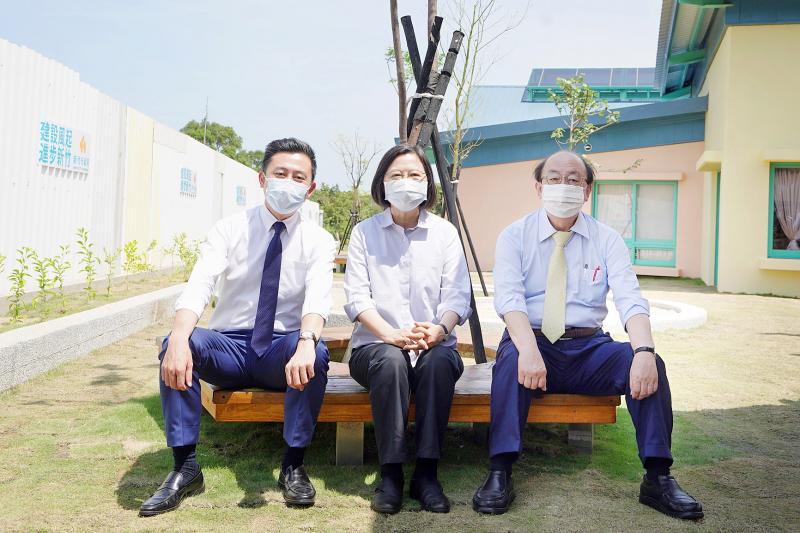Taiwan must secure a strategic position in the “new space age” and grasp the commercial opportunities heralded by low Earth orbit satellites, President Tsai Ing-wen (蔡英文) said yesterday.
The “new space age” refers to the increasing commercialization of space, with the private sector playing a more important role than national governments.
Tsai yesterday visited the headquarters of the National Space Organization (NSPO) at the Hsinchu Science Park along with Hsinchu Mayor Lin Chih-chien (林智堅).

Photo courtesy of the Hsinchu City Government
It is estimated that thousands of low Earth orbit satellites would be launched in the next decade, generating massive demand for satellite and ground equipment manufacturing, Tsai said.
The next decade is very crucial as many nations are also planning to return to the moon and Taiwan must secure a more strategically significant position in the “new space age,” she said.
Building on Taiwan’s strengths in semiconductors and precision manufacturing, the Ministry of Science and Technology and the National Development Fund are cooperating with local firms to try to grab a share of the global supply chain, she added.
Tsai expressed the hope that NSPO Director-General Wu Jong-shinn (吳宗信), nicknamed “Uncle Rocket,” would be able to “rocket” local space technology into space.
After Wu assumed his position on Aug. 2 he has been restructuring the NSPO to highlight the development of satellite payloads, components and avionics.
Asked about his rationale, Wu said that the NSPO in earlier years had to purchase many components from foreign suppliers when developing a satellite.
The lack of autonomous development of certain components caused uncertainty about their import and delayed satellite development, he said.
Following the restructuring, the NSPO would be able to devote more resources to developing satellite payloads and components, Wu said.
The flight control division and electrical engineering division have been merged into a new satellite avionics division, he said.
Speaking about the NSPO’s plans, Wu said weather satellite Triton (獵風者) is scheduled to be launched next year and it also plans to develop a second low Earth orbit communications satellite for the Beyond 5G project, set to be launched in 2025 or 2026.
The Beyond 5G project only consisted of one satellite when it was initiated by the Ministry of Science and Technology in January with a budget of NT$4 billion (US$144.3 million).
The specifications of the two B5G communications satellites would be comparable to those of the Starlink satellites developed by SpaceX, Wu said.
Asked whether there would be more funding to produce satellites, Executive Yuan Board of Science and Technology Executive Secretary Andrew Yeh (葉哲良) said that more deliberation is needed and that the results would be known by the end of this year.

MAKING WAVES: China’s maritime militia could become a nontraditional threat in war, clogging up shipping lanes to prevent US or Japanese intervention, a report said About 1,900 Chinese ships flying flags of convenience and fishing vessels that participated in China’s military exercises around Taiwan last month and in January have been listed for monitoring, Coast Guard Administration (CGA) Deputy Director-General Hsieh Ching-chin (謝慶欽) said yesterday. Following amendments to the Commercial Port Act (商港法) and the Law of Ships (船舶法) last month, the CGA can designate possible berthing areas or deny ports of call for vessels suspected of loitering around areas where undersea cables can be accessed, Oceans Affairs Council Minister Kuan Bi-ling (管碧玲) said. The list of suspected ships, originally 300, had risen to about 1,900 as

DAREDEVIL: Honnold said it had always been a dream of his to climb Taipei 101, while a Netflix producer said the skyscraper was ‘a real icon of this country’ US climber Alex Honnold yesterday took on Taiwan’s tallest building, becoming the first person to scale Taipei 101 without a rope, harness or safety net. Hundreds of spectators gathered at the base of the 101-story skyscraper to watch Honnold, 40, embark on his daredevil feat, which was also broadcast live on Netflix. Dressed in a red T-shirt and yellow custom-made climbing shoes, Honnold swiftly moved up the southeast face of the glass and steel building. At one point, he stepped onto a platform midway up to wave down at fans and onlookers who were taking photos. People watching from inside

Japan’s strategic alliance with the US would collapse if Tokyo were to turn away from a conflict in Taiwan, Japanese Prime Minister Sanae Takaichi said yesterday, but distanced herself from previous comments that suggested a possible military response in such an event. Takaichi expressed her latest views on a nationally broadcast TV program late on Monday, where an opposition party leader criticized her for igniting tensions with China with the earlier remarks. Ties between Japan and China have sunk to the worst level in years after Takaichi said in November that a hypothetical Chinese attack on Taiwan could bring about a Japanese

The WHO ignored early COVID-19 warnings from Taiwan, US Deputy Secretary of Health and Human Services Jim O’Neill said on Friday, as part of justification for Washington withdrawing from the global health body. US Secretary of State Marco Rubio on Thursday said that the US was pulling out of the UN agency, as it failed to fulfill its responsibilities during the COVID-19 pandemic. The WHO “ignored early COVID warnings from Taiwan in 2019 by pretending Taiwan did not exist, O’Neill wrote on X on Friday, Taiwan time. “It ignored rigorous science and promoted lockdowns.” The US will “continue international coordination on infectious